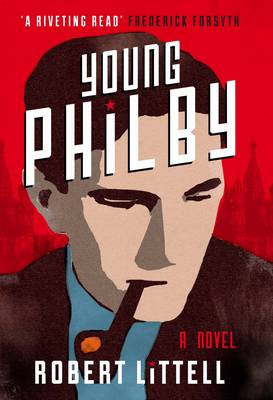
EURO CRIME
Reviews

Littell, Robert - 'Young Philby'
Hardback: 288 pages (Nov. 2012) Publisher: Gerald Duckworth & Co Ltd ISBN: 0715643282
YOUNG PHILBY by hugely experienced espionage writer Robert Littell is an intriguing take on the early life of Kim (Harold Adrian Russell) Philby, infamous "third man" of the Cambridge Soviet spy ring. Kim was born into privilege, attending Westminster School, and then Trinity College, Cambridge. Kim's father, St John Philby was an interesting character, a former intelligence officer, Arabist and adviser to Ibn Saud, the first King of Saudi Arabia. Philby was recruited as an agent for the Russian Secret Services (then called the NKVD) in the 1930s. He eventually defected to Moscow when he was on the verge of arrest after unmasking in the 1960s, having left the British intelligence services under a cloud of suspicion in the 1950s, following the defection of Burgess and MacLean to Moscow.
The novel opens shortly after Philby arrives in Vienna, in the run up to the doomed socialist rebellion against Chancellor Dollfuss. Although not a party member, Philby has come to Vienna to assist the communist underground, and meets and falls in love with Litzi Friedman, a Hungarian Jewish communist. Philby flees to England with Litzi after the rebellion (Vienna was not a safe place for a Jewish Communist refugee), and is recruited by the NKVD. Philby's first years as a Soviet spy were fairly uneventful. After his recruitment, it took Philby some time to develop the Establishment career that might garner useful information for the Russians. After spending time as an ostensibly pro-Franco Times correspondent in Civil War Spain, Philby is eventually recruited together with his fellow friend and Russian spy, Guy Burgess, to work for MI6 at the start of the Second World War. Philby continued working for MI6 after the war, as a counter-intelligence boss, ending up in pole position to scupper any suspicions by British intelligence of Soviet infiltration.
Littell writes from diverse points of view, including Litzi Philby, the louche and libidinous Guy Burgess, Philby's Russian handlers "Otto" and "Man", and Yelina Modinskaya, the Russian intelligence officer charged with deciding whether Philby was a British plant. This technique helps provide a more rounded view of a very slippery character, and adds interest and pace to the narrative. The characters are sufficiently well developed that the reader starts to develop sympathy even for the KGB officers who fall victim to the same paranoid political punishments that they themselves were complicit in administering to others. Littell also devotes some consideration to the triple agent theory, making some interesting, if not hundred percent convincing, conclusions. Much as Stalinist paranoia was a feature of the regime and its secret police, it is understandable why the infiltration of Soviet spies at such a high level of British intelligence seemed too good to be true to the Soviets.
Robert Littell injects fresh life into an oft told tale (histories, both fact and fiction about the "Cambridge Five" have remained enduringly popular over the last decades.); YOUNG PHILBY is a gripping and highly entertaining read, focussing mainly on the lesser publicised years of Kim Philby's life. I look forward to reading Robert Littell's earlier books, in particular THE COMPANY, his CIA novel which also touches upon Philby.
Laura Root, England
January 2013
More European crime fiction reviews can be found on the Reviews page.